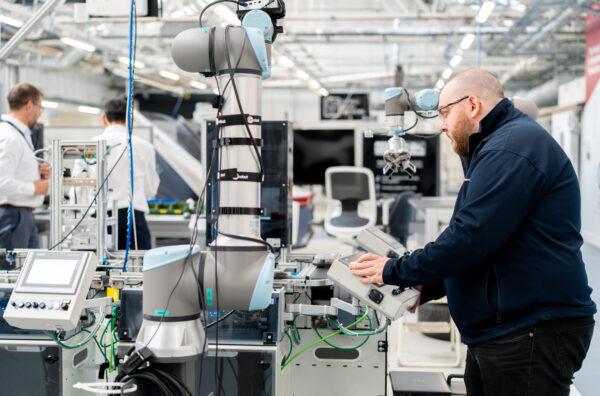By Carol Rose Burke, Unipart Managing Director – Design, Manufacturing and Engineering
 The automotive industry is undergoing a profound global transformation, with the shift to electric vehicles (EVs) fundamentally reshaping mobility as we know it. To truly future-proof this rapidly evolving sector, a critical emphasis must be placed on strengthening manufacturing and supply chain capabilities worldwide. This demands a proactive, collaborative approach that fosters innovation and strategic investment across the entire EV ecosystem. This imperative is a theme Unipart will champion at Cenex Expo 2025. As a leading platform for showcasing low-carbon vehicle technology and accelerating the future of mobility, Cenex provides a crucial forum to discuss how the industry can become a global leader in EV manufacturing and its supply chain, driven by ambitious strategies and affordable clean energy.
The automotive industry is undergoing a profound global transformation, with the shift to electric vehicles (EVs) fundamentally reshaping mobility as we know it. To truly future-proof this rapidly evolving sector, a critical emphasis must be placed on strengthening manufacturing and supply chain capabilities worldwide. This demands a proactive, collaborative approach that fosters innovation and strategic investment across the entire EV ecosystem. This imperative is a theme Unipart will champion at Cenex Expo 2025. As a leading platform for showcasing low-carbon vehicle technology and accelerating the future of mobility, Cenex provides a crucial forum to discuss how the industry can become a global leader in EV manufacturing and its supply chain, driven by ambitious strategies and affordable clean energy.
Challenges on the road to electrification
There is a sense of urgency across the manufacturing landscape, as many businesses within the EV supply chain are currently facing significant pressures. The rapid and often volatile transition to EVs is placing unprecedented demands on these companies. They are grappling with critical issues such as fluctuating demand and its impact on investment certainty, a challenging lack of immediate return on new infrastructure, and the constant need to respond quickly to changes throughout the entire supply chain. Crucially, while a considerable amount of attention has been paid to addressing the demand-side challenges surrounding the EV transition, such as consumer adoption and charging infrastructure, the equally vital supply chain issues have not always received the same level of focus and support. If the industry is to truly capitalise on its EV ambitions, we must collectively ensure we apply the right intellectual and commercial capacity to solve these intricate supply chain complexities.
Another pressing challenge is the sheer scale of investment required to build global EV manufacturing capabilities. This necessitates not only cutting-edge battery production and sophisticated vehicle assembly but also the proactive development of a comprehensive full lifecycle economy for EVs. Without this foresight, ensuring that every stage from initial material sourcing and manufacturing through to recycling, remanufacturing, and repurposing of batteries and components is integrated, these multi-billion-pound investments risk being incomplete. This integrated approach is critical to managing compounding cost pressures, enhancing a region’s long-term attractiveness for investment, and ensuring the sustainability and resilience of the entire EV supply chain.
 Building on global foundations
Building on global foundations
Despite these significant challenges, there are a number of inherent strengths and opportunities that the industry is uniquely positioned to build upon globally. One of the most important strengths lies in the history of automotive innovation and the exceptional skills and adaptability of the global workforce. At Unipart, we are proud to be actively contributing to scale technology and bridge skills gaps. One example is through The Institute for Advanced Manufacturing and Engineering (AME), a pioneering facility built in collaboration with Coventry University. While the AME is successfully preparing the next generation of highly-skilled engineers for advanced manufacturing, its impact extends beyond just skills development. It serves as a vital hub for strategic R&D projects, leveraging its expertise and access to funding to drive practical innovation. A prime example of this is Unipart’s successful transition from traditional Internal Combustion Engine (ICE) automotive skills to establishing a state-of-the-art EV battery facility. This significant achievement was born from a funded R&D project collaboratively nurtured within the AME, demonstrating how initial research and development can successfully secure further investment and scale into real-world manufacturing capabilities. To date, the AME has facilitated over £110 million of R&D projects, generating an impressive £500 million of economic value for industry. This strategic, ongoing investment in skills and R&D is crucial to capitalising on existing automotive clusters.
Furthermore, we must proactively and strategically leverage the immense circular economy opportunity that the EV transition presents. If the industry can excel in developing robust and efficient circular economies for EV batteries and other key components, it unlocks an invaluable opportunity: the creation of a closed-loop supply of crucial materials. This strategic positioning could firmly establish regions as global leaders in decarbonised EV manufacturing, offering both environmental advantages and supply chain security.
Finally, the paramount importance of collaboration cannot be overstated. A truly robust EV ecosystem can only be built through strong, proactive collaboration between automotive manufacturers, cutting-edge technology firms, energy providers, and visionary policymakers. For example, the UK Industrial Strategy launched this year shows good intent with advanced manufacturing and the clean energy transition high priorities, but it’s now about how the economy collaborates to deliver that strategy empowered by a resilient supply chain. A more transparent and genuinely cooperative approach across these diverse stakeholders will be instrumental in streamlining supply chains, proactively reducing risks, and significantly accelerating the pace of innovation throughout the sector. Industry bodies, alongside government agencies, play a crucial role in facilitating this collaboration. By actively fostering an open dialogue between all stakeholders and encouraging joint ventures and strategic alliances, the industry can cultivate an environment where the EV sector truly thrives.
Our call to action
My unequivocal message to industry bodies, governments, customers, and the wider sector is clear: we must adopt a resolute, collaborative approach. This means prioritising our global manufacturing and supply chain capabilities as a collective strategic imperative. While the industry has often embraced globalised views of supply chains, the uniqueness of the EV transition demands a deliberate, concerted effort. Now is the decisive time to focus intensely on collaborating worldwide, through the framework of a comprehensive and ambitious industrial strategy. This strategy must be multifaceted, encompassing targeted R&D, improved incentives, and robust policy support, enabling suppliers globally to rapidly scale up and meet the needs of domestic and international OEMs. This concerted effort is how we will secure the resilience, foster the innovation, and guarantee the long-term competitiveness of the automotive future.
The path to a thriving, resilient EV industry is clear, though challenging. Unipart, with its unique blend of advanced manufacturing expertise, intelligent supply chain solutions, and a deeply-embedded culture of continuous improvement, is ready to play its crucial part. Building on this foundation, we are pleased to be launching our comprehensive end-to-end EV life cycle solution. This offering is designed to directly address the imperative we champion, providing partners with seamless solutions from world-class battery testing and diagnostics, through warranted EV battery remanufacturing, to specialised logistics, storage, and the comprehensive management of EV battery life cycles for optimal value recovery and sustainability. By working hand-in-hand across industry, government, and academia, we can overcome existing hurdles, accelerate the transition to electric mobility, and engineer a sustainable, prosperous future for the automotive sector worldwide.
This article was published in the Cenex Expo 2025 show issue.
